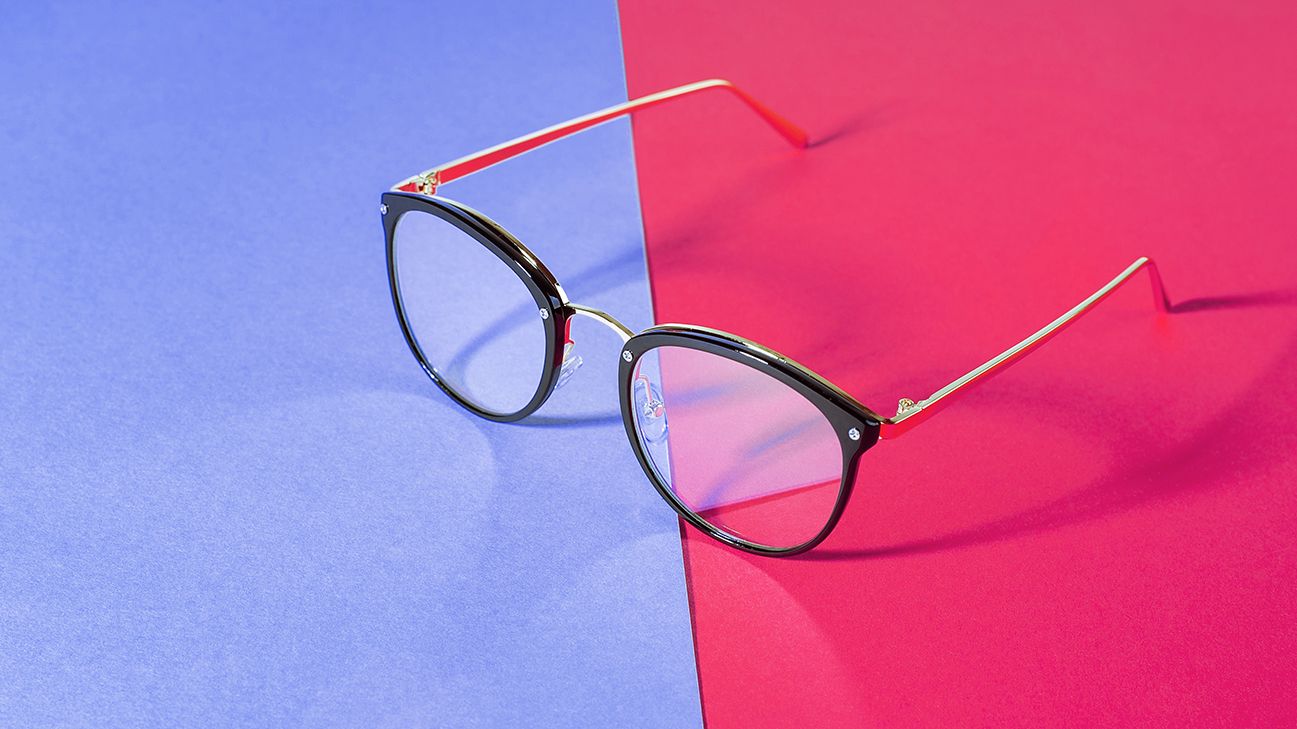Blue light glasses are all the rage ATM. Designed to block blue light from penetrating your peepers, lots of folks wear them to stave off digital eye strain symptoms.
But are these lenses legit? Here’s what the science says.
Do blue light glasses really work?
Maybe. Some peeps claim blue-light-blocking glasses are the real deal. Studies have shown that blue-light-blocking glasses are effective at reducing blue light. But we need more research to prove they can actually:
- reduce eye strain
- prevent eye damage
- combat blurry vision
- improve your sleep cycle
- prevent headaches or migraine

Blue light is part of the visible light spectrum. It has a wavelength of about 380 to 500 nanometers (nm). It can be absorbed by your eye’s pupil or iris and can also penetrate your corneas 👀.
It might have a bad rap, but blue light isn’t all bad. It’s naturally emitted by the sun and can boost your attention during daylight hours.
The downside? Folks who spend a lot of time in front of a screen are getting way more blue light. High energy short wave blue light — which is around 415 to 455 nm — is the most harmful. Electronic devices like laptops, cellphones, and TVs all might emit this wavelength.
Symptoms that might point to too much blue light include:
- Dry eyes. You blink less often when you stare at a screen. This can lead to dry, itchy eyes.
- Eye damage. Some folks think blue light can lead to permanent loss of vision quality and can increase your risk of ocular diseases. But there’s not a ton of research to back this up.
- Blurry vision. Your eyes need to take a siesta sometimes. Starting at anything — including screens — can lead to blurry vision.
- Disrupted sleep. Blue light *might* trick your mind into thinking it’s still daytime. This might make it harder to fall asleep at night.
- Headaches or migraine attacks. A lot of peeps say blue light gives them headaches. But again, we need more research.
Lots of lenses have a coating that protects your eyes from ultraviolet (UV) light. Blue-light-blocking glasses are the same idea. Most are coated with a yellow tinted material that helps filter or block out blue light.
Some users say these glasses reduce digital eye strain symptoms. While there’s not enough research to 10/10 show they work, here’s what they might help you with.
Eye strain
Eye strain is a common symptom of staring at screens all day (and night). Some studies suggest blue light can play a part in this. So blue light glasses could potentially help reduce eye fatigue.
Eye damage
We know that long-term ultraviolet (UV) light exposure can increase your risk of eye diseases. But we know a lot less about blue light.
According to a 2018 research review, experts are beginning to think blue light might lead to eye damage. But again, we need more proof.
Sleep
Wanna get your scroll on before bedtime? Same. Blue light glasses might help your body understand it’s time for Mr. Sandman.
Your bod uses light to keep the 24-hour cycle constant. So exposure to blue light might mess up your circadian rhythm.
Blue light could also impact your melatonin, a hormone that helps control your sleep cycle. A 2018 study found that folks who were exposed to blue light for 2 hours had lower melatonin levels than those who weren’t exposed.
Which blue light glasses should you get?
Check out our Where to Buy Blue Light Glasses Guide and Felix Gray Review.
Eye strain is a common culprit behind headaches. So in theory, blue-light-blocking glasses might help curb your migraine attacks. But we def need more research to show this is legit.
P.S. Not all eye strain headaches stem from blue light. If your migraine episodes are caused by something else, blue light glasses prob won’t help.
While we wait for research to prove blue-light-blocking glasses are where it’s at, here are some other fab tips to limit your exposure.
Adjust your screen’s blue light
Keep your phone on “night mode” all day long. The warmer tones are easier on the eyes.
Pro tip: You can also buy blue-light-filtering protective screens to reduce glare. Research shows they can block up to 60 percent of blue light.
Eye drop it up
Make sure your eyes are lubed up. Eye drops like artificial tears can prevent your peepers from getting too dry. A room humidifier is also a great way to keep them moist.
20/20/20 strategy
A quick screen break might make a big difference. Take a break every 20 minutes and focus on an object about 20 feet away for 20 seconds.
Give yourself some space
Try to keep your screens an arm’s length away. If it’s harder to read text you can adjust the font setting on your phone or zoom in on your computer.
Get your eyes checked on the reg
Making some minor lifestyle adjustments can totes make your eyes feel better in the short term. But it’s still super important to schedule an appointment with an ophthalmologist or optometrist (aka eye doctor) if you notice any symptoms of eye strain or deteriorating vision.
They can test your vision to see if you need prescription lenses or medication to help your eyes function on fleek.
Blue-light-blocking glasses might help reduce digital eye strain. This could lead to better sleep, less headaches, and better vision. But we def need more research to prove the perks are for real.
While we don’t know if they actually work, it can’t hurt to try. You don’t need a prescription to buy them and some brands are hella cute and affordable.
